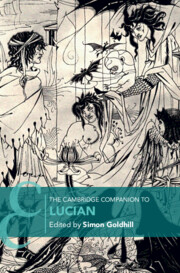Book contents
- Frontmatter
- Contents
- List of Figures and Tables
- List of Contributors
- 1 Introduction
- Part I
- 2 Lucian and the Culture of Criticism
- 3 Lucian’s Poetics
- 4 Lucian and Philosophy
- 5 On Believing in Lucian: The Religious Polemics
- 6 Lucian and Art History
- 7 Some Queer Entanglements in Lucian’s Erotes
- Part II
- Part III
- References
- Index Locorum
- Subject Index
- Cambridge Companions to Literature
5 - On Believing in Lucian: The Religious Polemics
from Part I
Published online by Cambridge University Press: 07 November 2024
- Frontmatter
- Contents
- List of Figures and Tables
- List of Contributors
- 1 Introduction
- Part I
- 2 Lucian and the Culture of Criticism
- 3 Lucian’s Poetics
- 4 Lucian and Philosophy
- 5 On Believing in Lucian: The Religious Polemics
- 6 Lucian and Art History
- 7 Some Queer Entanglements in Lucian’s Erotes
- Part II
- Part III
- References
- Index Locorum
- Subject Index
- Cambridge Companions to Literature
Summary
Lucian’s position as a commentator on religion has been debated intensely since late antiquity: for most of the last two millennia, it has been the main focus for commentators. This is primarily due to Lucian teasing Christians in a couple of places (although in fact they get off relatively lightly); but he is also, and indeed much more insistently, scathing about aspects of Greco-Roman ‘paganism’. This chapter begin by unpicking some of this reception history, and showing how modern scholarly perspectives remain locked into nineteenth-century cultural-historical narratives (which were designed to play ‘Hellenism’ off against ‘Christianity’, in various forms). It then argues that we should set aside the construct of Lucian’s status as a religious ‘outsider’— a legacy of nineteenth-century thinking — and consider Lucian instead as an agent operating within the field of Greek religion, and contributing richly (albeit satirically) to ongoing, vital questions over humans’ relationship with the divine. He should be ranged, that is to say, alongside figures like Aristides, Pausanias, and Apuleius as keen observers of the religious culture of the time.
- Type
- Chapter
- Information
- The Cambridge Companion to Lucian , pp. 99 - 114Publisher: Cambridge University PressPrint publication year: 2024

